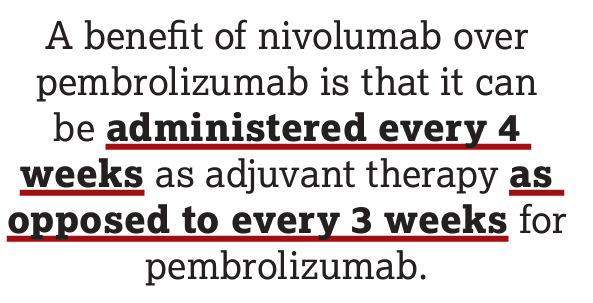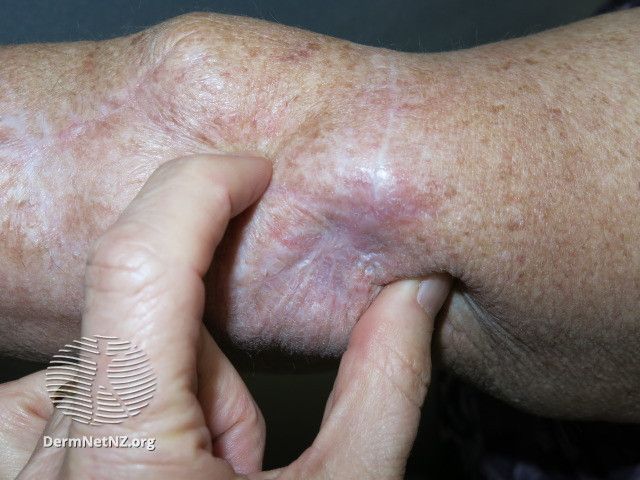- Case-Based Roundtable
- General Dermatology
- Eczema
- Chronic Hand Eczema
- Alopecia
- Aesthetics
- Vitiligo
- COVID-19
- Actinic Keratosis
- Precision Medicine and Biologics
- Rare Disease
- Wound Care
- Rosacea
- Psoriasis
- Psoriatic Arthritis
- Atopic Dermatitis
- Melasma
- NP and PA
- Skin Cancer
- Hidradenitis Suppurativa
- Drug Watch
- Pigmentary Disorders
- Acne
- Pediatric Dermatology
- Practice Management
- Prurigo Nodularis
- Buy-and-Bill
Publication
Article
Dermatology Times
A Shift in Adjuvant Therapy: FDA Approves Nivolumab for Completely Resected Stage IIB/C Melanoma
Author(s):
Immunotherapies, including PD-1 checkpoint inhibitors such as nivolumab, have improved the treatment options for patients with advanced melanoma.
Treatment for patients with melanoma is undergoing a paradigm shift. In October 2023, the FDA approved nivolumab (Opdivo; Bristol Myers Squibb) for patients 12 years and older with completely resected stage IIB/C melanoma.1 This recent approval is considered a groundbreaking development for patients who have advanced melanoma.
Wide local excision of advanced melanoma is one of the primary ways of clearing a tumor.2,3 There is a risk of microscopic invasion of cancer cells with this surgery, and there may be a risk of disease recurrence, but adjuvant therapy can help decrease the risk.2 Although preferences vary among practices and academic institutions, clinicians usually recommend that patients with stage II melanoma have a sentinel lymph node biopsy to assess for lymph node involvement.4 If the lymph node biopsy results indicate cancer is in the sentinel node (stage III), a lymph node dissection then is performed. Additional treatment with immune checkpoint inhibitors or targeted therapy drugs may also be recommended to prevent recurrence.
Immunotherapies, including PD-1 checkpoint inhibitors such as nivolumab, have improved the treatment options for patients with advanced melanoma. Nivolumab was originally approved for the treatment of patients with advanced melanoma and was found to have increased efficacy with ipilimumab (Yervoy), which targets CTLA-4 to activate the immune system.5 To be eligible under the initial FDA approval, patients had to be 12 years and older and have metastatic or unresectable melanoma.1 It also was included as an adjuvant treatment option for patients 12 years or older with completely resected stage III or IV melanoma.1
Sponsored by Bristol Myers Squibb, the phase 3 CheckMate-76K trial (NCT04099251) studied the effectiveness of nivolumab adjuvant immunotherapy vs placebo in participants after complete resection of stage IIB/C melanoma with no evidence of disease.6,7 Prior to being randomly assigned, participants were required to undergo complete resection of their stage IIB/C melanoma, have a pathology excision report showing negative surgical margins, and have negative sentinel lymph node results. Participants received 480 mg of nivolumab intravenously on the first day of each 4-week treatment cycle. Treatment was stopped if there was recurrence or progression of the melanoma, the patient had completed 12 months of treatment, the patient had withdrawn consent, or there was unacceptable toxicity. For recurrence-free survival, nivolumab reduced the risk of disease recurrence or death vs placebo by 58%.7 The most adverse reactions included pruritus, diarrhea, arthralgias, rash, and fatigue.7 Nivolumab has a manageable adverse effect profile compared with other traditional cancer treatments.7

Now that the FDA has approved nivolumab for the treatment of patients with completely resected stage IIB/C melanoma, it will have an even greater role in melanoma treatment. In 2021, the FDA approved pembrolizumab (Keytruda; Merck) for a similar indication in patients with stage IIB/C melanoma.8 Mohammed M. Milhem, MBBS, said, “It’s good that they included [patients 12 years and older]. Pembrolizumab was approved a while back and we have been using it for the past 2 years…. This is not a new indication in this current space.” Milhem is the Holden Chair of Experimental Therapeutics; director of the Division of Hematology, Oncology, and Blood & Marrow Transplantation; and a clinical professor of internal medicine at the University of Iowa in Iowa City.
A benefit of nivolumab over pembrolizumab is that it can be administered every 4 weeks as adjuvant therapy as opposed to every 3 weeks for pembrolizumab.6,9 Having 2 agents available for the same indication will increase the access and availability of these medications for patients with advanced melanoma. Even with the challenge of treating this aggressive disease, nivolumab will now provide a new opportunity for improved quality of life and increased longevity in patients with completely resected stage IIB/C melanoma.
Nicole A. Negbenebor, MD

Nicole Negbenebor, MD, is a Mohs micrographic surgery and cutaneous oncology fellow in the Department of Dermatology at the University of Iowa in Iowa City.
References
1. U.S. Food and Drug Administration approves Opdivo (nivolumab) as adjuvant treatment for eligible patients with completely resected stage IIB or stage IIC melanoma. Bristol Myers Squibb. News release. October 13, 2023. Accessed October 23, 2023. https://news.bms.com/news/corporate-financial/2023/U.S.-Food-and-Drug-Administration-Approves-Opdivonivolumab-as-Adjuvant-Treatment-for-Eligible-Patients-with-Completely-Resected-Stage-IIB-or-Stage-IIC-Melanoma1/default.aspx
2. Treatment of melanoma, by stage. American Cancer Society. Updated March 22, 2022. Accessed October 23, 2023. https://www.cancer.org/cancer/types/melanoma-skin-cancer/treating/by-stage.html
3. Di Raimondo C, Lozzi F, Di Domenico PP, Campione E, Bianchi L. The diagnosis and management of cutaneous metastases from melanoma. Int J Mol Sci. 2023;24(19):14535. doi:10.3390/ijms241914535
4. Wong SL, Balch CM, Hurley P, et al; American Society of Clinical Oncology; Society of Surgical Oncology. Sentinel lymph node biopsy for melanoma: American Society of Clinical Oncology and Society of Surgical Oncology joint clinical practice guideline. Ann Surg Oncol. 2012;19(11):3313-3324. doi:10.1245/s10434-012-2475-3
5. Toor K, Middleton MR, Chan K, Amadi A, Moshyk A, Kotapati S. Comparative efficacy and safety of adjuvant nivolumab versus other treatments in adults with resected melanoma: a systematic literature review and network meta-analysis. BMC Cancer. 2021;21(1):3. doi:10.1186/s12885-020-07538-1
6. Long GV, Del Vecchio M, Weber J, et al. Adjuvant therapy with nivolumab versus placebo in patients with resected stage IIB/C melanoma (CheckMate 76K). Presented at: Society for Melanoma Research 2022 International Congress; October 17-20, 2022; Edinburgh, Scotland.
7. Kirkwood J, Del Vecchio M, Weber J, et al. Adjuvant nivolumab in resected stage IIB/C melanoma: primary results from the randomized, phase 3 CheckMate 76K trial. Nat Med. Published online October 16, 2023. doi:10.1038/s41591-023-02583-2
8. Zhang S, Bensimon AG, Xu R, et al. Cost-effectiveness analysis of pembrolizumab as an adjuvant treatment of resected stage IIB or IIC melanoma in the United States. Adv Ther. 2023;40(7):3038-3055. doi:10.1007/s12325-023-02525-x
9. Rutkowski P, Czarnecka AM. Pembrolizumab for the adjuvant treatment of IIB or IIC melanoma. Expert Rev Anticancer Ther. 2023;23(9):897-902. doi:10.1080/14737140.2023.2247565







